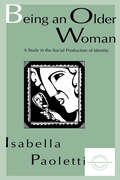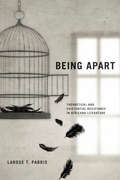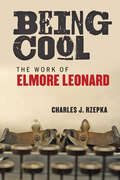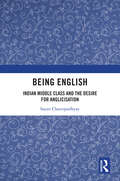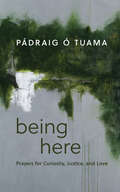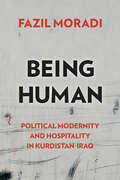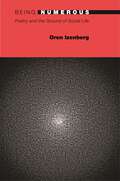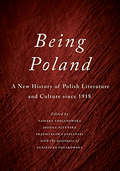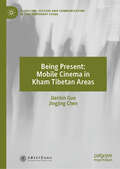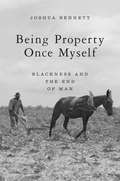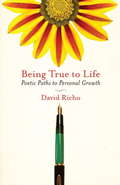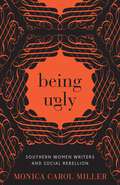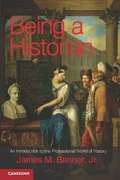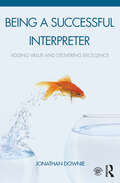- Table View
- List View
Being An Older Woman: A Study in the Social Production of Identity (Everyday Communication Series)
by Isabella PaolettiThe study presented in this volume examines how older women's identities are socially constructed and, in particular, how they can be influenced by institutional intervention. The interest in identity production is not only theoretical, but also practical. Different perceptions of oneself as an older woman involve considerable differences in the definition of that person's possible sphere of action, and therefore, in her life perspectives. The data -- collected during a four-year project studying older women -- consist of video recordings of the committee meetings of the Older Women's Group of Perugia, Italy. Other video recordings of theater workshops and of the management committee meetings of the Senior Citizen Centers in Perugia are used as a source of comparison. Transcripts of the video material are analyzed through a detailed discourse analysis within an ethnomethodological framework. The data are used to explore how gender and age identities are interactionally constructed in specific institutional contexts. The first part of the book focuses on the interactional construction of aging. It shows how "being old" is constructed conversationally, in particular, through the use of membership categories. Distancing from the category "old" and denial of aging are frequently encountered conversational moves. However, the category is perceived as acceptable, even desired and invoked, when it becomes an institutionally relevant category, giving access to interesting activities or special benefits. The second part of the book explores gender identification. Conflict among different institutional subjects is shown to fade into gender conflict. The study analyzes how institutional interventions exert a powerful influence on older women's identities, giving them new opportunities for action. It also looks at how the conversational styles, attitudes, and activities of specific women influence the features of those very institutions. In short, this book describes the discourse and social practices that constitute older women's identities -- helping to identify and deconstruct stereotypes that tend to produce marginalization of older people. The book's existence is itself a contribution to the construction of older women as busy, lively, appealing human beings; it is the first research publication to emerge from The European Older Women's Project. Of interest to those in any discipline studying the topics of ethnomethodology, gender, aging, and identity.
Being Apart: Theoretical and Existential Resistance in Africana Literature
by Larose T. ParrisIn Being Apart, LaRose Parris draws on traditional and radical Western theory to emphasize how nineteenth- and twentieth-century Africana thinkers explored the two principal existential themes of being and freedom prior to existentialism's rise to prominence in postwar European thought. Emphasizing diasporic connections among the works of authors from the United States, the Caribbean, and the African continent, Parris argues that writers such as David Walker, Frederick Douglass, W. E. B. Du Bois, C. L. R. James, Frantz Fanon, and Kamau Brathwaite refute what she has termed the tripartite crux of Western canonical discourse: the erasure of ancient Africa from the narrative of Western civilization, the dehumanization of the African and the creation of the Negro slave, and the denial of chattel slavery's role in the growth of Western capitalism and empire. These writers' ontological and phenomenological ruminations not only challenge the assigned historical and epistemological marginality of Africana people but also defy current canonical demarcations. Charting the rise of Eurocentrism through a genealogy of eighteenth-century Enlightenment racial science while foregrounding the lived Africana experience of racism in the late nineteenth and twentieth centuries, Parris shows that racist ideology is intrinsic to modern Western thought rather than being an ideological aberration.
Being Cool: The Work of Elmore Leonard
by Charles J. RzepkaAn in-depth look into the life and work of the man who defined "cool" for crime fiction, Elmore Leonard.Widely known as the crime fiction writer whose work led to the movies Get Shorty and Out of Sight, Elmore Leonard had a special knack for creating "cool" characters. In Being Cool, Charles J. Rzepka looks at what makes the dope-dealers, bookies, grifters, financial advisors, talent agents, shady attorneys, hookers, models, and crooked cops of Leonard's world cool. They may be nefarious, but they are also confident, skilled, and composed. And they are good at what they do. Taking being cool as the highway through Leonard's life and works, Rzepka finds plenty of byways to explore along the way.Rzepka delineates the stages and patterns that characterize Leonard’s creative evolution. Like jazz greats, he forged an individual writing style immediately recognizable for its voice and rhythm, including his characters' rat-a-tat recitations, curt backhands, and ragged trains of thought. Rzepka draws on more than twelve hours of personal interviews with Leonard and applies what he learned to his close analysis of the writer’s long life and prodigious output: 45 published novels, 39 published and unpublished short stories, and numerous essays written over the course of six decades.
Being English: Indian Middle Class and the Desire for Anglicisation
by Sayan ChattopadhyayThis book critically examines the cultural desire for anglicisation of the Indian middle class in the context of postcolonial India. It looks at the history of anglicised self-fashioning as one of the major responses of the Indian middle class to British colonialism. The book explores the rich variety of nineteenth- and twentieth-century writings that document the attempts by the Indian middle class to innovatively interpret their personal histories, their putative racial histories, and the history of India to appropriate the English language and lay claim to an “English” identity. It discusses this unique quest for “Englishness” by reading the works of authors like Michael Madhusudan Dutt, Rabindranath Tagore, Cornelia Sorabji, Nirad C. Chaudhuri, Dom Moraes, and Salman Rushdie. An important intervention, this book will be of interest to scholars and researchers of postcolonial studies, Indian English literature, South Asian studies, cultural studies, and English literature in general.
Being Here: Prayers for Curiosity, Justice, and Love
by Pádraig Ó Tuama&“What is prayer? It&’s not a passport to heaven. If anything, it&’s a way of seeing here, a way of being here.&” In Being Here, acclaimed poet and theologian Pádraig Ó Tuama offers a thoughtful collection of prayers and essays to focus attention in a world full of distractions. Featuring 31 collects—an ancient five-fold form of prayer—this unconventional devotional invites readers into a daily rhythm of connection and creativity. &“The hope is that you can turn to a prayer with the story of your life, and in the little emptiness you create there, hear something, discern something, feel something that&’s connecting you to other things seeking out connection with you.&” Each day&’s prayers are presented alongside scripture and illuminating literary texts. The book concludes with four incisive essays on politics, community, and the contours of contemporary life as seen through biblical literature. Pádraig also teaches readers how they can embrace poetic form to expand their practice of prayer. In these pages, spiritual wayfarers will find a place to both rest and grow their capacity for curiosity, justice, and love. This is a way of living / That&’s worth living daily.
Being Human: Political Modernity and Hospitality in Kurdistan-Iraq (Genocide, Political Violence, Human Rights)
by Fazil MoradiThe Iraqi Baʿth state’s Anfāl operations (1987-1991) is one of the twentieth century’s ultimate acts of destruction of the possibility of being human. It remains the first and only crime of state in the Middle East to be tried under the 1948 UN Genocide Convention, the 1950 Nuremberg Principles, and the 1969 Iraqi Penal Code and to be recognized as genocide, crimes against humanity, and war crimes in Baghdad between 2006 and 2007. Being Human: Political Modernity and Hospitality in Kurdistan-Iraq offers an unprecedented pathway to the study of political violence. It is a sweeping work of anthropological hospitality, returning to the Anfāl operations as the violence of political modernity only to turn to the human survivors’ hospitality and acts of translation—testimonial narratives, law, politics, archive, poetry, artworks, museums, memorials, symbolic cemeteries, and infinite pursuit of justice in the Kurdistan Region of Iraq. Being Human gathers together social sciences, humanities, and the arts to understand modernity's violence and its living on.
Being Numerous: Poetry and the Ground of Social Life (20/21 #11)
by Oren Izenberg"Because I am not silent," George Oppen wrote, "the poems are bad." What does it mean for the goodness of an art to depend upon its disappearance? In Being Numerous, Oren Izenberg offers a new way to understand the divisions that organize twentieth-century poetry. He argues that the most important conflict is not between styles or aesthetic politics, but between poets who seek to preserve or produce the incommensurable particularity of experience by making powerful objects, and poets whose radical commitment to abstract personhood seems altogether incompatible with experience--and with poems. Reading across the apparent gulf that separates traditional and avant-garde poets, Izenberg reveals the common philosophical urgency that lies behind diverse forms of poetic difficulty--from Yeats's esoteric symbolism and Oppen's minimalism and silence to O'Hara's joyful slightness and the Language poets' rejection of traditional aesthetic satisfactions. For these poets, what begins as a practical question about the conduct of literary life--what distinguishes a poet or group of poets?--ends up as an ontological inquiry about social life: What is a person and how is a community possible? In the face of the violence and dislocation of the twentieth century, these poets resist their will to mastery, shy away from the sensual richness of their strongest work, and undermine the particularity of their imaginative and moral visions--all in an effort to allow personhood itself to emerge as an undeniable fact making an unrefusable claim.
Being Poland: A New History of Polish Literature and Culture since 1918
by Tamara Trojanowska Joanna Nizynska Przemyslaw Czaplinski Agnieszka PolakowskaBeing Poland offers a unique analysis of the cultural developments that took place in Poland after World War One, a period marked by Poland’s return to independence. Conceived to address the lack of critical scholarship on Poland’s cultural restoration, Being Poland illuminates the continuities, paradoxes, and contradictions of Poland’s modern and contemporary cultural practices, and challenges the narrative typically prescribed to Polish literature and film. Reflecting the radical changes, rifts, and restorations that swept through Poland in this period, Polish literature and film reveal a multitude of perspectives. Addressing romantic perceptions of the Polish immigrant, the politics of post-war cinema, poetry, and mass media, Being Poland is a comprehensive reference work written with the intention of exposing an international audience to the explosion of Polish literature and film that emerged in the twentieth century.
Being Present: Mobile Cinema in Kham Tibetan Areas (Pluralism, Culture and Communication in Contemporary China)
by Jianbin Guo Jingjing ChenThis book presents the restoration of rural mobile cinema network in the Great Triangle region at the conjunction of Yunnan, Sichuan, and Tibet in China in the new century, which has added a new chapter to the long-standing complex relationship between cinema and social change. Based on five years of multi-sited fieldwork, abundant interviews and oral history narratives, this work shows the entanglement of the State, the projectionists and local film viewers in the historical and social context in a holistic analytic framework. By using the key concept of “being present” to examine the tangling relations between the actors in mobile cinema as social practice, the work argues that mobile cinema and contemporary Chinese society are mutually constructed in both textual and practical level.
Being Property Once Myself: Blackness and the End of Man
by Joshua BennettA prize-winning poet argues that blackness acts as the caesura between human and nonhuman, man and animal. Throughout US history, black people have been configured as sociolegal nonpersons, a subgenre of the human. Being Property Once Myself delves into the literary imagination and ethical concerns that have emerged from this experience. Each chapter tracks a specific animal figure—the rat, the cock, the mule, the dog, and the shark—in the works of black authors such as Richard Wright, Toni Morrison, Zora Neale Hurston, Jesmyn Ward, and Robert Hayden. The plantation, the wilderness, the kitchenette overrun with pests, the simultaneous valuation and sale of animals and enslaved people—all are sites made unforgettable by literature in which we find black and animal life in fraught proximity. Joshua Bennett argues that animal figures are deployed in these texts to assert a theory of black sociality and to combat dominant claims about the limits of personhood. Bennett also turns to the black radical tradition to challenge the pervasiveness of antiblackness in discourses surrounding the environment and animals. Being Property Once Myself is an incisive work of literary criticism and a close reading of undertheorized notions of dehumanization and the Anthropocene.
Being True to Life: Poetic Paths to Personal Growth
by David RichoPsychotherapist David Richo offers a fresh and inspiring approach to personal growth: we can use the process of writing and reading poetry to move toward greater self-understanding and emotional healing. Even if you've never written a poem before, you can learn to use poetry to explore your feelings, your relationships, your childhood, your dreams, and more.Richo explains how the creative, intuitive process of making poetry can help us gain access to our deepest truths, leading us to make connections and explore experiences in a new way, beyond the constraints of everyday language. This book offers a range of practical exercises for getting started, as well as guidance on how to read poetry in a way that can be personally transformative.Being True to Life shows us that poetry is not reserved for a few specially talented individuals but is a deeply human activity that anyone can tap into for greater clarity and insight into life's struggles, beauty, and mysteries.
Being Ugly: Southern Women Writers and Social Rebellion (Southern Literary Studies)
by Monica Carol MillerIn the South, one notion of “being ugly” implies inappropriate or coarse behavior that transgresses social norms of courtesy. While popular stereotypes of the region often highlight southern belles as the epitome of feminine power, women writers from the South frequently stray from this convention and invest their fiction with female protagonists described as ugly or chastised for behaving that way. Through this divergence, “ugly” can be a force for challenging the strictures of normative southern gender roles and marriage economies. In Being Ugly: Southern Women Writers and Social Rebellion, Monica Carol Miller reveals how authors from Margaret Mitchell to Monique Truong employ “ugly” characters to upend the expectations of patriarchy and open up more possibilities for southern female identity. Previous scholarship often conflates ugliness with such categories as the grotesque, plain, or abject, but Miller disassociates these negative descriptors from a group of characters created by southern women writers. Focusing on how such characters appear prone to rebellious and socially inappropriate behavior, Miller argues that ugliness subverts assumptions about gender by identifying those who are unsuitable for the expected roles of marriage and motherhood. As opposed to familiar courtship and marriage plots, Miller locates in fiction by southern women writers an alternative genealogy, the ugly plot. This narrative tradition highlights female characters whose rebellion offers a space for re-imagining alternative lives and households in opposition to the status quo. Reading works by canonical writers like Zora Neale Hurston, Flannery O’Connor, and Eudora Welty, along with recent texts by contemporary authors like Helen Ellis, Lee Smith, and Jesmyn Ward, Being Ugly offers an important new perspective on how southern women writers confront regressive ideologies that insist upon limited roles for women.
Being a Historian: An Introduction to the Professional World of History
by James M. Banner Jr.Considers what aspiring and mature historians need to know about the discipline of history in the United States today.
Being a Reader™ [Grade 1], Handwriting Notebook
by Center for the Collaborative Classroom StaffNIMAC-sourced textbook
Being a Reader™ [Grade 2], Word Study Notebook
by Center for the Collaborative Classroom StaffNIMAC-sourced textbook
Being a Reader™ [Grade K], Handwriting Notebook
by Center for the Collaborative Classroom StaffNIMAC-sourced textbook
Being a Reader™, Grade 1, Reproducibles
by Center for the Collaborative ClassroomNIMAC-sourced textbook
Being a Reader™, Grade 2, Reproducibles
by Center for the Collaborative ClassroomNIMAC-sourced textbook
Being a Reader™, Grade K, Reproducibles
by Center for the Collaborative ClassroomNIMAC-sourced textbook
Being a Reader™, High-frequency Word Cards, 172 cards
by Center for the Collaborative Classroom StaffNIMAC-sourced textbook
Being a Reader™, Sound Cards, 80 cards
by Center for the Collaborative Classroom StaffNIMAC-sourced textbook
Being a Reader™: Learning Letter Names, Grades K-1, Reproducibles
by Center for the Collaborative ClassroomNIMAC-sourced textbook
Being a Successful Interpreter: Adding Value and Delivering Excellence
by Jonathan DownieBeing a Successful Interpreter: Adding Value and Delivering Excellence is a practice-oriented guide on the future of interpreting and the ways in which interpreters can adjust their business and professional practices for the changing market. The book considers how globalisation and human migration have brought interpreting to the forefront and the subsequent need for interpreters to serve a more diverse client base in more varied contexts. At its core is the view that interpreters must move from the traditional impartial and distant approach to become committed to adding value for their clients. Features include: Interviews with leading interpreting experts such as Valeria Aliperta, Judy and Dagmar Jenner and Esther Navarro-Hall Examples from authentic interpreting practice Practice-driven, research-backed discussion of the challenges facing the future of interpreting Guides for personal development Ideas for group activities and development activities within professional associations. Being a Successful Interpreter is a practical and thorough guide to the business and personal aspects of interpreting. Written in an engaging and user-friendly manner, it is ideal for professional interpreters practising in conference, medical, court, business and public service settings, as well as for students and recent graduates of interpreting studies. Winner of the Proz.com Best Book Prize 2016.
Being a Writer™ [Grade 3] Student Skill Practice Book
by Developmental Studies Center StaffThis component provides students with additional one-page practice activities for each of the mini-lessons in the Skill Practice Teaching Guide for Grade 3. These practice activities are modeled after and are similar to the activity used by the teacher in the minilesson. Consumable.
Being a Writer™ [Grade 3] Student Writing Handbook
by Developmental Studies Center StaffThe handbook is an interactive, dynamic Grade 3 student tool that supports each week's lessons with genre excerpts that are used for the development of writing conventions and skills. Consumable.
